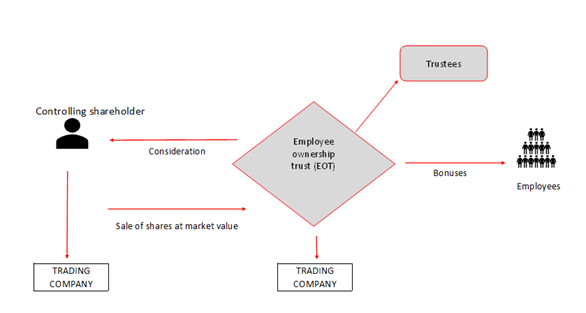13 February 2023
Employee Ownership Trusts
Succession planning for business owners – when the time comes to consider stepping away from the business you’ve worked very hard to build, it’s really important to consider all available strategies to ensure the best outcome for all involved. Employee Ownership Trusts could offer a win-win solution – zero Capital gains tax is due for the seller and the employees can receive tax free bonuses of up to £3,600 per year.
What is an Employee Ownership Trust?
It is a legal structure which allows a business owner to sell their shares in their trading company to a specially constructed trust which holds said shares for the benefit of the company’s employees. A typical structure is shown below.

The seller receives payment for the value of their shares in tranches, usually contingent on future profits. The business may need to find external funding to meet these commitments.
What are the benefits?
There are many. According to the Employee Ownership Association co-owned companies tend to be more successful, competitive, profitable and sustainable.
For the seller, whether they sell the whole of their shareholding or part (the trust must acquire a controlling interest), the proceeds they receive are not subjected to capital gains tax. This represents a minimum saving of 10% assuming Business Asset Disposal relief would be available, and 20% if it isn’t. Relief is also available from inheritance tax on transfers into and out of an EOT.
More than just a tax saving, business owners who choose this route give reassurance to their employees about a change of ownership to a potentially outside investor who may not share the same ethos. They also see it as a way to reward the commitment and loyalty of their employees and to maintain the balance they may have spent many years developing.
For the employees, apart from the enhanced feeling of involvement in the company, they can also participate in the profits by means of a bonus that is tax free up to a maximum of £3,600 per year.
What are the downsides?
From the seller’s perspective, they are likely to have to wait for years to receive the full value of their shares. As they will want to stay involved until finalised, the feeling of true ownership by the management team and employees may feel lessened.
Complex rules – to obtain the attractive tax breaks, all parties need to meet specific and stringent criteria, both at the start and throughout its existence. We can guide you through these.
Summary
This article is a high level summary of what an EOT is and how it may benefit the parties involved. It could be the ideal solution for a business owner who is ready to retire from their business. If this is of interest to you and you’d like to know more, we would be delighted to discuss so please do get in touch.
How can Haines Watts help?
We advise clients with a broad range of tax and compliance matters throughout the South West region.
If you would like to have a conversation to understand the complexities of the above, please get in touch with your usual Haines Watts contact.





